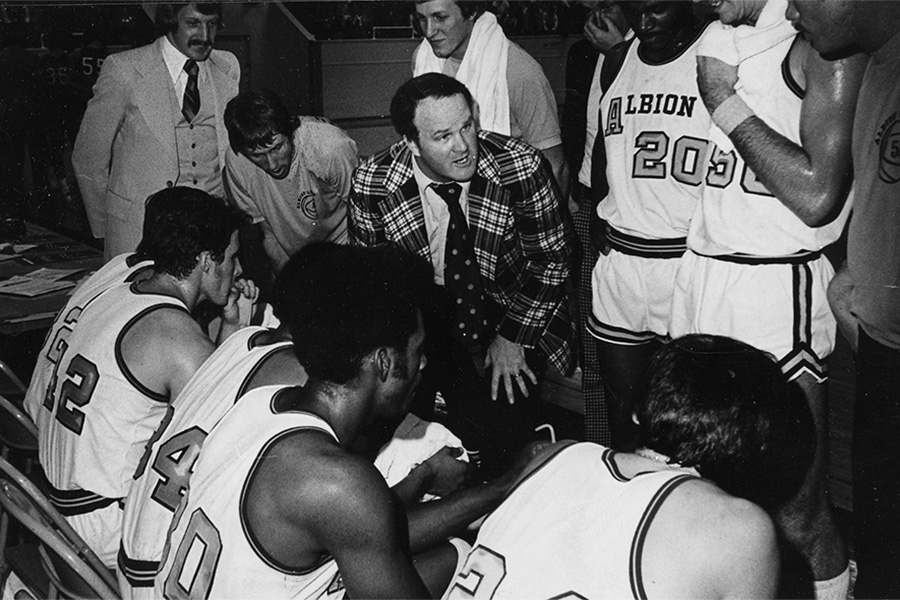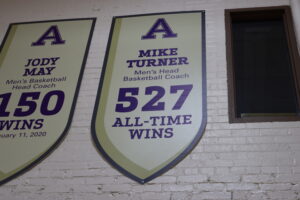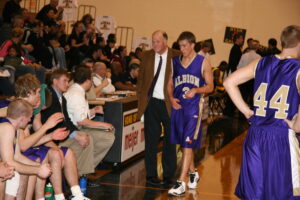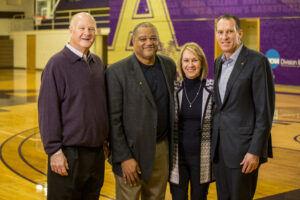Coach Turner To Be Honored With Dedication Ceremony
December 22, 2022
By Jake Weber

“They told me I’m no spring chicken, so we’d better do this now,” jokes Mike Turner, ’69, of the upcoming dedication of Albion’s Mike Turner Floor in Kresge Gymnasium. The dedication is part of a perfect day for Turner: three basketball games followed by a reception for Turner’s former players and coaches, community members, classmates and other friends.
“I’m incredibly humbled by this honor,” says the enviably fit, 70-something Turner. “And I’m really excited about all the people who are coming. It’s basketball season and a lot of people are busy, but finding a way to come. I’m really looking forward to it.”
In the Beginning

The son of a high school basketball coach, Turner — like a lot of kids — also imagined a career in his father’s footsteps.
“My dad was an optometrist, and I thought I might do that, too,” he recalls. “Then I got to Albion, and it was clear, that wasn’t going to work for me.”
It was Turner’s mom who coached a high school girls’ game that is almost unrecognizable today — 3-on-3 with offensive players restricted to certain court zones. Turner credits his mother with showing him the potential of coaching and education.
Albion’s “winningest coach” with a career record of 527-319 in basketball, Turner also coached 30 seasons of golf, plus a few in both soccer and tennis. As a professor of physical education, Mike worked with students looking for careers in healthcare and K-12 education.
And while it’s been more than a decade since he stepped down as head coach, Turner is still devoted to “his” team. Not only does he attend most home games, Turner frequently watches practice and talks to head coach Jody May nearly every day.
“I was Mike’s assistant for 11 years and having him as a mentor has meant the world to me,” says May. Both Turner and May are clear: May calls the shots and Turner pitches in with very occasional advice. But May also notes that his approach to the game — and the role of coach — is very much a product of Turner’s example.
“Mike taught me a lot about basketball and even more about how the relationships with the players are extremely important,” May reflects. “You can learn all the Xs and Os but how to be a good person and do things the right way, how to run a program was what he really taught me.”
As a collegiate athlete, Turner says he was “not very successful,” but adds that being on Albion’s basketball team was one of many positive experiences. Classes with physical education professors Elkin “Ike” Isaac and Char Duff, English professor Jim Cook and history professor Coy James, along with Sigma Nu fraternity and volunteer service influenced his career path. “I officiated basketball (and other sports at Starr Commonwealth,” Turner says. “I liked working with the kids. It was a good experience.”
He was then one of three alumni accepted to the University of Arizona’s graduate program in education, recruited by UA athletic director Cedric Dempsey, ’54. Turner finished that degree just in time to move back to Albion with classmate Peg Mitchell Turner, ’69, to become assistant men’s basketball coach.
“We thought we’d be here for a few years, but Peg started teaching and we built relationships in the community,” Turner says. The couple welcomed daughters Amy and Tracy during those early years, and Turner is far from alone in crediting his family’s support as an important factor in his professional success.
“While he was coaching, a lot of his friends thought if Mike was unable to coach, Peg could probably step in,” says emeritus professor of art Doug Goering. “She gets on officials and she knows the game. She’s been part of Albion basketball almost as much as Mike has.”
Turner agrees. “Peg, Amy and Tracy were always there, from when they came to the game in car seats,” he says. “Without that, I wouldn’t have done this. Jody’s mom, his wife Julie, and their son Jackson are at the games now. It’s how it should be and it’s hard without it.”
Beyond the Basket

Turner didn’t become an Albion legend by concentrating solely on basketball; he eventually earned the rank of full professor in the physical education department, and coached 30 seasons of men’s golf.
“He was awesome and we absolutely loved him. We had a really good group of guys and were a pretty good team,” says Gregg Colburn, ’94, one of many former golfers who are still in touch with their coach.
Colburn further explained that Turner’s coaching style reflected his understanding of how to get the best from every athlete. “He’s a good golfer and he gets it; you can’t will your way to good golf; the coach sometimes just has to let the players go,” Colburn says. “I’ve had other team experiences and this was one of the best. I treasure my time on the team at Albion.”
Former players and assistant coaches can tell countless stories about Turner’s caring and empathetic nature. But tell him that he wasn’t the kind of coach who yells or throws things and a mischievous glint comes into Turner’s eye. “I wouldn’t say there haven’t been heated moments,” he says. “Remember, this is basketball we’re talking about.”
There’s a big difference between winning and losing, and it’s a lot more fun winning,” he continues, musing on the balance between “nice guy” and “competitive coach.” Coaching is “about more than winning and losing, but I wouldn’t have lasted as long as I did without success. You learn things from losing, but you learn a lot more from winning.”
So — how did he manage all that winning? The key, says Turner, was in giving equal attention to developing the athlete and the team member. “We worked really hard on building trust, and to do that, the players had to be honest with me and I needed to be honest with them about everything,” Turner explains. “You don’t have to agree on everything, but at the end of the day, you have to trust that you can come together and follow the plan.”
It’s a legacy that isn’t limited to Albion. “My core principles, on the court, in the locker room, in regards to academics, and what kind of men we want our players to become, are all a direct reflection of the lessons I learned from Coach Turner,” says John VanderWall, ’01, who recently posted his 300th win as head coach for Marietta College. “I know there are many other Albion alums who coach college and high school basketball, who can say the exact same thing. The tentacles of Coach Turner’s teachings far exceed the Albion community and so many people are better off because of Coach T.”
Beyond the Campus

Coach Turner, ’69, with Milt Barnes, ’79, Joe, ’82, and Julie Serra
Professional service highlights during Turner’s career included leadership within the Michigan Intercollegiate Athletic Association, the National Basketball Coaches Association and the NCAA Division III Tournament Committee. At Albion, Turner also served more than 30 years as a faculty marshall for convocations and Commencement.
Turner’s most significant volunteer service, however, was focused on Albion College and the Albion community. For decades, Albion College men’s basketball players have spent countless hours tutoring and mentoring children in Albion’s elementary schools. Turner notes it began in the ’70s with Michael Williams, ’78, and Milton Barnes, ’79, and today includes students from dozens of teams and student organizations.
“It’s hard to describe the value of having Mike’s players and other students work with our children,” says Nancy Graham Roush, ’72, former teacher and principal in Albion Public Schools. “The academic support is even more effective when the children have these college students encouraging them. Mike’s support for this program, for so many years, was a great gift to Albion.”
“There’s always a ‘teacher’s pet’ and I think some of the guys on the team might have put me in that category,” laughs Barnes. He credits Mike and Peg with lighting the initial spark, decades ago, that led Barnes to eventually found PlayRight Sports Academy in Albion (Barnes also coaches basketball at Jackson High School).
At various times during the past decade, Barnes and Turner have also been colleagues, working in Institutional Advancement on special projects. “Mike’s relationships go far beyond coaching and athletics; his former players are doctors, lawyers, business owners,” Barnes says. “He’s shown me the value of those relationships, how when we needed participation and support, he’d get it. He’s done a lot more than coaching, when it comes to Albion.”
The Short and Long of It
Along with his IA work, these days Turner still plays a lot of golf, and when he’s not in the Kresge stands, he and Peg are often in Grand Rapids, watching one of their five grandkids play one of five different sports or perform in a concert or play.
And right now, the upcoming Albion College honor also has him reviewing the past.
“Kresge has so many great memories: made shots and missed shots, short-shorts and long shorts, sweeping the floor. I remember one game, the net ripped and everyone waited while I got the ladder out and fixed it. I was the driver when we returned from Hope in 1978, in the middle of a snowstorm that closed the campus for three days. That was a scary adventure,” he says.
“When you’re coaching, you’re thinking, ‘How am I going to get through the day?’ and it never occurs to you what your legacy might be,” he adds.
“My coaching experience allowed me to be a teacher and a leader. We taught the players how to get the most out of themselves, how to read and react to different situations, and them we led them to have success. I’m still proud of all they’re doing,” he says. “Not everyone gets to go to work every day and do what they love. I’m glad I had the opportunity to do that.”